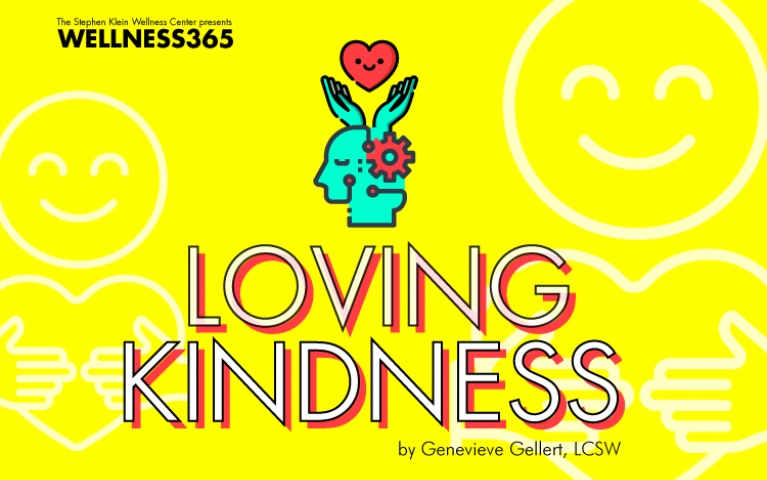Wellness365: Loving Kindness

There is a German word, weltschmerz, which translates literally to “world-pain or world weariness.” The word is meant to describe a sensitivity to the ills of the world and the misery of human suffering, with use in German poetry around the time of the first world war.
I feel this often-- personally and professionally. One of the many rewards of working as a Behavioral Health Consultant as a licensed clinical social worker is getting to know all that it means to be human-- seeing life begin, heal, and end.
I’ve locked myself in a bathroom at work to simultaneously eat lunch and cry alone more times than I can count because of this feeling of world-pain and weariness.
When I’m asked by students, colleagues, friends and family how I cope and why I chose to be a social worker, as there are certainly other professional paths to select focused less on healing individual and collective suffering, one reason always comes to mind: loving-kindness.
Loving-kindness is tenderness and consideration towards self and others. My propensity towards feeling loving-kindness brought me to the field of social work and to Project HOME. It is also a practice that prevents me from burning out in my chosen work and helps me maintain my mental health while working.
I had intended to write exclusively about safer sexual health and wellness, a light-hearted and perhaps even trite piece on sex in the spirit of Valentine’s Day.
Sexual health is health. While I have no shortage of practical tips for safer and more satisfying sexual experiences, it felt inauthentic to write about them given the current state of world affairs and my emotional response to them.
At the root of my guidance on safer sexual health practices is loving-kindness, anyway. Kindness—not technique—yields the most satisfying sex lives, and here’s why: Kindness is a choice to treat ourselves and each other, especially in the most trying of times, with acceptance, friendliness, generosity, and consideration.
As Dr. Kristin Neff explains, kindness is one of three ingredients for self-compassion.
Along with kindness, mindfulness—the non-judgmental awareness of our thoughts, feelings, and experiences as they are—and the recognition of our shared, imperfect humanity create the foundation for self-compassion.
While I believe self-compassion yields the most ideally satisfying experiences—which then by default include our sexual experiences—I find that self-compassion is more difficult to both cultivate and sustain.
Kindness yields creativity and safety, both of which are necessary for healthy, diverse sexual expression, especially for those coping with sexual dysfunction, trauma, or other medical concerns that compromise our sexual experiences, like chronic pain, substance use, or taking certain medications.
My understanding of the necessity of kindness in sexual health is rooted in my understanding of the necessity of kindness to create a healthier society, grounded in my training as a social worker.
We are living in a time where there is no act of kindness too random or too small. Kindness is the antidote to the feeling of world-pain and weariness.
Kindness is an active process, though. It’s a process that begins with being kind with ourselves, especially in the most vulnerable of experiences, like sex.
Here are my favorite ways to cultivate loving-kindness:
Participate in Random Acts of Kindness Day 2020 on Monday, February 17th.
Make an appointment with your doctor(s) for annual follow-up.
Be welcoming to neighbors, new students, and new staff.
Offer to take a photo of someone struggling with their selfie.
Tune in (or out if needed) to your 5 senses. Sensuality, the process of fulfilling the senses, is a core mindfulness experience that helps facilitate kindness and self-compassion in sex and in everyday life. Just take a breath, relax, and focus on each of the following words. Simply notice what you notice:
- Sight
- Sound
- Smell
- Touch
- Taste
Sometimes, getting into our senses is overwhelming, especially for those with a trauma history. Knowing when to pull back and focus on something less intense is equally as valid and mindful.
Write positive sticky notes. Grab a stack of sticky notes and spend five minutes writing positive statements on them. Then place the sticky notes anywhere that needs a little kindness like an office, a bus stop, a gas pump, a parked car, a hallway, or hidden around your home!
Here are a few phrases to get you started:
- You know who’s awesome? Read that first word again.
- Hey, you’re great.
- You’re the reason someone smiles today / You gave me a reason to smile today.
- I appreciate everything you do.
- Psst…you’re awesome
Practice loving-kindness meditation, like the one below from Thich Nhat Hanh, a Vietnamese Buddhist monk and peace activist.
“To practice this meditation, sit still, calm your body and your breathing, and recite it to yourself. The sitting position is wonderful for practicing this. Sitting still, you are not too preoccupied with other matters, so you can look deeply at yourself as you are, cultivate your love for yourself, and determine the best ways to express this love in the world.
May I be peaceful, happy, and light in body and spirit.
May she be peaceful, happy, and light in body and spirit.
May he be peaceful, happy, and light in body and spirit.
May they be peaceful, happy, and light in body and spirit.
May I be safe and free from injury.
May she be safe and free from injury.
May he be safe and free from injury.
May they be safe and free from injury.
May I be free from anger, afflictions, fear, and anxiety.
May she be free from anger, afflictions, fear, and anxiety.
May he be free from anger, afflictions, fear, and anxiety.
May they be free from anger, afflictions, fear, and anxiety.”